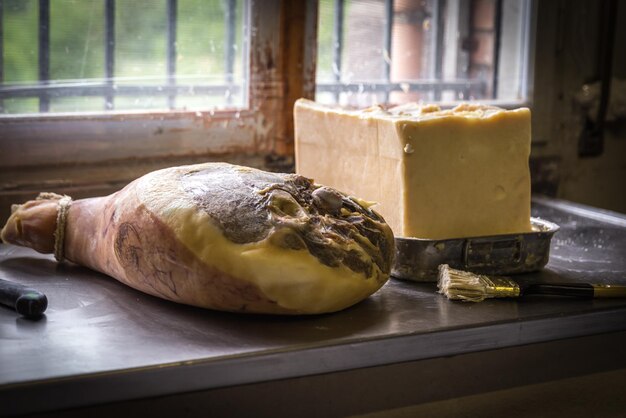How Long Does Cheese Last in Your Fridge? A Complete Guide to Cheese Storage
Cheese, in its myriad forms and flavors, is a beloved staple around the world. But if you've ever discovered a forgotten slice deteriorating in the depths of your fridge, you might be left wondering: How long does cheese really last in the refrigerator? This comprehensive guide will explore everything you need to know about storing cheese, ensuring your favorite varieties remain fresh and safe to eat.
🧀 Understanding Cheese Types and Their Longevity
Hard Cheeses
Hard cheeses such as Parmesan, Pecorino, and Cheddar are durable and often come with a long shelf life, thanks to their low moisture content. In the refrigerator, you can expect hard cheeses to last anywhere from 3 to 6 months if unopened. Once opened, they typically remain good for about 3 to 4 weeks.
Semi-Hard Cheeses
These include varieties like Gouda, Edam, and Emmental. Semi-hard cheeses balance firmness with flavor and generally last 1 to 2 months when sealed. After opening, they remain edible for 2 to 3 weeks.
Soft Cheeses
Soft cheeses, including Brie, Camembert, and Chevre, have a higher moisture content, making them more susceptible to spoilage. Unopened, these cheeses usually stay fresh for 1 to 2 weeks. Once opened, it's best to consume them within 5 to 7 days.
Fresh Cheeses
Fresh cheeses like Ricotta, Cottage Cheese, and Mozzarella are best consumed swiftly due to their high moisture levels. These should ideally be eaten within 5 to 7 days of purchase, regardless of whether they are opened or not.
🔍 Factors Affecting Cheese Shelf Life
- Storage Temperature: Cheese fares best in the coldest parts of the refrigerator, ideally around 34-38°F (1-3°C).
- Packaging: Store cheese in its original packaging until opened. Afterward, wrap it tightly in plastic wrap or parchment paper.
- Cheese Maturity: Mature cheeses last longer compared to younger cheeses which continue to develop flavor and texture over time.
- Moisture Content: Cheeses with higher moisture content usually spoil faster than those with lower water percentages.
🧂 Best Practices for Storing Cheese
Proper Wrapping Techniques
- Wax or Parchment Paper: Ideal for wrapping cheese to allow it to breathe and prevent it from becoming too moist.
- Plastic Wrap: Use for hard cheeses after an initial wrap in wax paper to prevent drying out.
- Plastic Containers: Fresh cheeses like Ricotta come in containers that should be tightly sealed to maintain freshness.
Storing Cheese in the Refrigerator
- Cheese Drawer: Many refrigerators have a dedicated cheese drawer designed to maintain optimal humidity levels.
- Avoid Crisper Drawers: These are usually too humid and can lead to premature spoilage.
- Top Shelf: Location near the top of the fridge is often slightly warmer and works well for softer cheeses that don't require extreme cold.
Tips for Recognizing Spoiled Cheese
- Mold: While surface mold is expected on some cheeses (like Brie), it's not typical for fresh cheeses.
- Texture Changes: Any slimy or overly dry texture might indicate spoilage.
- Odor: A strong, unpleasant odor could signal deterioration.
📝 Quick Reference Guide for Cheese Storage
Here's a handy visual guide to help harness everything discussed:
| Cheese Type | Unopened Shelf Life | Opened Shelf Life |
|---|---|---|
| Hard | 3 - 6 months | 3 - 4 weeks |
| Semi-Hard | 1 - 2 months | 2 - 3 weeks |
| Soft | 1 - 2 weeks | 5 - 7 days |
| Fresh | 5 - 7 days | 5 - 7 days |
🥇 Enhancing Cheese Enjoyment
Cheese Serving Tips
- Room Temperature: Allow cheese to sit out at room temperature for about 30 minutes before serving to enhance its flavors and texture.
- Accompaniments: Pair with fruits, nuts, and bread to complement each cheese type.
Creative Uses for Cheese
- Cooking: Utilize any cheese remnants to enrich pasta dishes, salads, or baked goods.
- Freezing: Though not typically ideal due to texture changes, hard and semi-hard cheeses can be frozen when properly wrapped, extending their usable life.
🍽️ A Final Bite
Proper cheese storage in the refrigerator involves a combination of understanding cheese types, employing the right techniques, and knowing how to spot spoilage. By following these guidelines, you can extend the life of your beloved cheese while maintaining its quality and safety. Whether you're a casual snacker or a gourmet aficionado, this knowledge empowers you to make the most out of every delectable bite. Remember, well-stored cheese is not only a treat for the taste buds but also a homage to the art and tradition that goes into crafting each precious wedge.
Keep these tips in mind next time you're reorganizing your fridge, and you'll be on your way to becoming a true cheese connoisseur! 🍷🧀

